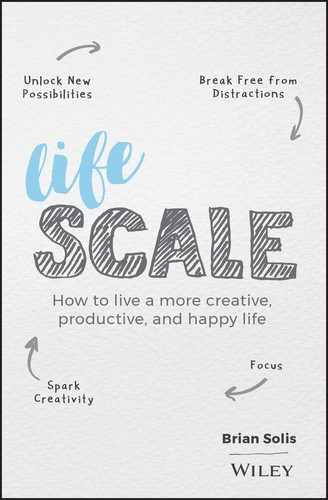Chapter 2
Awaken
The Gift of Awareness Is a Gift We First Give Ourselves, then Everyone Else
“Raise your awareness and share your uniqueness to the world.”
– Amit Ray
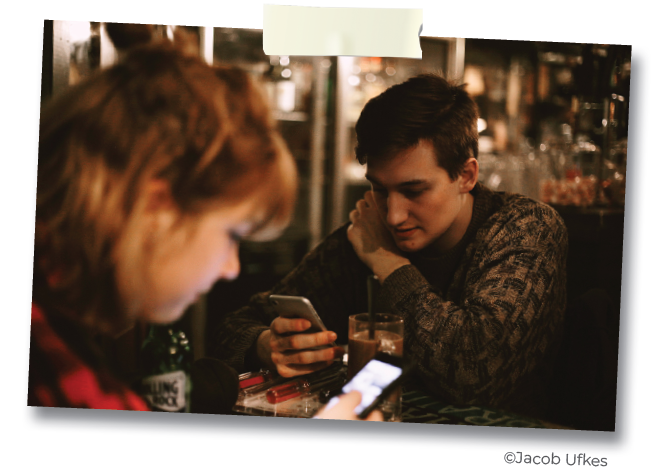
Digital distraction is not something we were prepared for. Generations of education, parenting, management, and absorbing everyday ethics and norms couldn't have prepared us for the onslaught of information, showers of attention, celebration of self-interest and selfishness, and the flooding of egocentric emotions.
We didn't mean to become addicted. As with cigarettes in the early days, we didn't understand that our digital indulgences were made to be addictive, and we didn't have information about the health effects—on our bodies, emotions, and psyches.
The Path to Distraction: How Did We Get Here?
I'm sure you have sometimes caught yourself in the mindless pattern of an “endless scroll,” where you, without even thinking, scrolled and scrolled and scrolled, viewing and reacting to content, not because you wanted to, but because you couldn't help yourself. There's a reason for that.
Our attention is traded as a commodity and the more of it we spend on any given platform or device, the more these hosts can sell it for.
As a geek apologist who championed Web 2.0, social media, and mobile apps, I was a hopeless optimist. Through my work I advised organizations, governments, institutions, and individuals on ways to best use these technologies for good. Over time, however, novices, opportunists, spammers, scammers, and eventually, villains, found insidious ways to gobble up our attention and capitalize on it. Some intentionally, and others unintentionally, exploited discoveries about how we could be manipulated to spend more and more time with their enticements.
Mark Zuckerberg, Steve Jobs, Twitter founders Evan Williams and Jack Dorsey, Snapchat founder Evan Spiegal, and the other leaders of web innovation played an intentional and influential role in capitalizing on human vulnerabilities. There are two ways to readily influence behavior: (1) manipulate it or (2) inspire it. The technology companies have chosen, for the most part, to manipulate it.
The attention economy has been wildly lucrative. No wonder; our attention is finite, which creates limited supply and great demand. Netflix CEO Reed Hastings once said the company's number one competitor was sleep. “And, we're winning!” he proudly exclaimed to shareholders.1 The attention economy is no mere metaphor; our attention is traded as a commodity and the more of it we spend on any given platform or device, the more those hosts can sell it for.
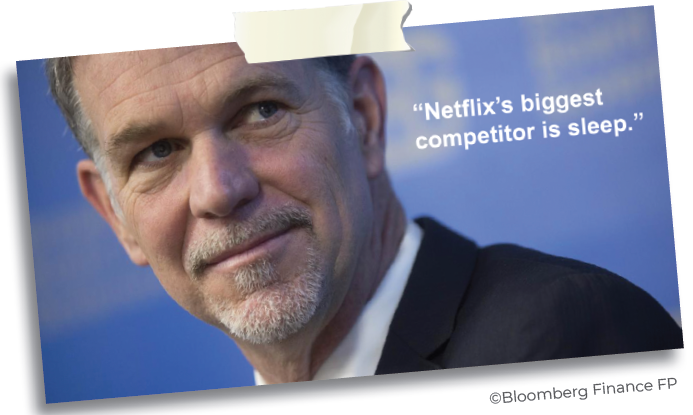
Justin Rosenstein, one of the four Facebook designers behind the “Like” button, explained the potential and danger of social rewards in an interview with Vice.2 “The main intention I had was to make positivity the path of least resistance. And I think it succeeded in its goals, but it also created large unintended negative side effects. In a way, it was too successful.”

Persuasive design is a methodology that focuses on influencing human behavior through a product or service's characteristics.3 Many of today's digital methodologies were honed and taught by B.J. Fogg, a behavior scientist who is the founder and director of the Stanford Behavior Design Lab. He's also been called the millionaire maker as his work has inspired many of his students to create some of the world's addictive, and therefore more lucrative apps, games, and networks.4 Defenders of these approaches state that they can also have positive effects on behavior, such as training people to take medicine regularly, develop weight loss habits, or learn new skills or subjects. However, it seems that harm is potentially outweighing good. In April 2018, 50 psychologists signed a letter to the American Psychological Association accusing psychologists working at tech companies of using persuasive design and to ask the APA to take an ethical stance on behalf of children.5
Developers knowingly use persuasive casino tricks and many exploitive design techniques that are directly linked to addiction in the games, networks, apps, and devices we use. These hidden “manipulation techniques” are used to hold our attention so it can be monetized.6

To influence behavioral change, you need motivation, ability, and triggers. For example, in social media, motivation can come in the form of people's need for attention, engagement, and social connection or on the other side, as the fear of missing out, or FOMO. Triggers include likes, comments, and connection requests. Research has shown that these triggers release delightful hits of chemical stimulants in our brains, such as oxytocin, serotonin, dopamine, and endorphins.
Did you know slot machines make more money in the United States than baseball, movies, and theme parks combined? According to NYU professor Natasha Dow Schull, author of Addiction by Design, slot machines are designed to addict. In her research, she found that people get “problematically involved” with slot machines three to four times faster than other forms of gambling.7
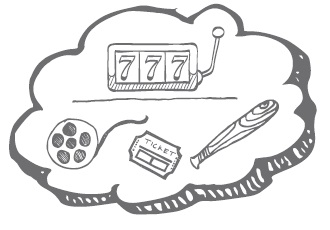
Slot machines are so addictive because they employ another psychological technique for enrapturing us, called intermittent variable rewards.8 When you pull a lever, you hope to win a prize or reward. This is an intermittent action linked to a variable reward. The variable here is that you may win or, most likely, you may not win. The designer's goal is to keep you playing that machine in the hopes that you're going to win.
Former Google engineer Tristan Harris explains, “You pull a lever and immediately receive either an enticing reward (a match, a prize!) or nothing. Addictiveness is maximized when the rate of reward is most variable.”9 Software designers have incorporated this trick into all sorts of their products.
When you open your favorite app, check your email, and endlessly scroll or swipe, you're subconsciously trying to “win” something. But ask yourself, what exactly are you trying to win?
The manipulation is more obvious in the design of video games, which employ this as well as other addictive tactics. They offer all sorts of overt prizes for navigating their gauntlet of obstacles, but the real prize driving addiction to them is self-esteem. Richard Freed is a child and adolescent psychologist and the author of Wired Child: Reclaiming Childhood in a Digital Age.10 He's discovered that video games are so addictive for boys because they have a particularly strong developmental drive to rack up accomplishments. All of the hidden cash boxes and points rewards they get, he explains, are designed “to make them feel like they are mastering something.” The irony being that, as he says, this leads to “bad [gaming] habits and statistically poor academic performance.”11
Another psychological hijack is social reciprocity. If someone pays you a compliment, for example, you feel the need to return the compliment. Or, if you ask for a favor, at some point, you will return that favor. If someone says, “Thank you,” you feel compelled to respond with, “You're welcome.” This can play out in digital life, as well. If you send an email, it's discourteous if the recipient doesn't reply right away. If you follow someone online, it's disrespectful (and even hurtful) if they don't follow you back.
When you open your favorite app, check your email, and endlessly scroll or swipe, you're subconsciously trying to “win” something.

This is why networks, for example, notify you when someone tags you in a post or lets you know when someone “read” your message. Or, when you send a message, you can see the wavering dots when someone is replying to you. And in some apps, you can see how long it's been since you've interacted with someone. You feel anticipation and pressure to stay engaged, to respond, to check back, to interact.
The anticipation of the experience is sometimes more powerful (and dangerous) than the experience itself. These engagement tricks or hacks are driving more usage than enjoyment. All the while, your attention is for sale. This is presumably why Bill Gates and Steve Jobs raised their kids tech-free.12
The technology companies have been engaged in a form of psychological warfare, competing in every way they can think of for our attention by exploiting our minds' weaknesses. It's only getting more competitive and, as a result, more dangerous. Ramsay Brown, the COO of start-up Dopamine Tech, admitted in an interview that his team uses artificial intelligence and neuroscience to make you even more addicted to your phone.13
“We use AI and neuroscience to increase your usage . . . make apps more persuasive . . . it's not an accident. It's a conscious design decision. We're designing minds. The biggest tech companies in the world are always trying to figure out how to juice people.”
In 2017 and 2018, the proverbial you-know-what hit the fan about all of this manipulation. Suddenly, all of technology's secrets were surfacing, their impact brought into greater focus by global events that demonstrated the darkest side of digital media.

“Former Facebook exec says social media is ripping apart society; No civil discourse, no cooperation; misinformation, mistruth.”14
“We have the power of gods without the prudence and compassion of gods. It's a race to the bottom of the brain stem . . . getting people's attention.”
Sean Parker on Facebook: ‘God only knows what it's doing to our children's brains'; Parker says he's become a ‘conscientious objector' on social media”15
“Apple CEO becomes latest tech bigwig to warn of social media's dangers”16
At a conference in New York that promoted the importance of design ethics in digital technology, Tristan Harris said that a team of engineers at the company were controlling the minds of two billion users. “We have the power of gods without the wisdom, prudence and compassion of gods,” he said. “It's a race to the bottom of the brain stem . . . getting people's attention at all costs.”17

Experts recommend spending 25 minutes to two hours working on a project at a time. If you're spending less than 25 minutes on an important or challenging task, then you're killing concentration and deflating your ability to warm up your brain before you quit. Your brain typically takes 23 minutes and 15 seconds to return to work following a distraction.18
I recently spent a year studying the effect of disruptive consumer technologies on our wellness and capacity for personal growth. I was hired by a global luxury beauty brand to specifically research the impact of consumer relationships with tech to understand its impact on interpretations of beauty, self-esteem, and happiness. Was a digital culture that encouraged teens to constantly take selfies eroding their confidence and making them obsess over achieving an unreachable standard of beauty? I interviewed women from the ages of 13 to 61, and my life was forever changed.
I was deeply concerned—horrified, actually—about the findings. While the research findings are confidential, I can say that women of all ages are measuring themselves by an impossible standard of beauty, with little or zero education, parenting, professional, or medical help to repair the destructive impact.
Experts recommend spending 25 minutes to 2 hours working on a project at a time. If you're spending less . . . then you're killing concentration.
Social media has also been linked to increased suicide by teens. For instance, research has found that an eighth-grader's risk for depression jumps 27% when he or she frequently uses social media, and depression is a leading indicator for suicide.19 In fact, teen suicide now eclipses homicide rates in the United States, and smartphones and social media are the suspected culprits.20
Some of the strongest findings about ill-effects concern our constant switching between apps and real-world tasks, or what researchers call rapid toggling between tasks. In fact, we're not really multitasking as much as we're task-switching. Essentially, we are attempting to interact and progress while interchanging attention and context across devices and applications.
In her eye-opening TED Talk, Manoush Zomorodi, journalist and author of Bored and Brilliant: How Spacing Out Can Unlock Your Most Productive and Creative Self, shared a conversation with neurologist Dr. Daniel Levitin who said the following about switching between distractions.
“Every time you shift, you shift your attention, from one thing to another, the brain has to engage a neurochemical switch, that uses up nutrients in the brain to accomplish that. So, if you're attempting to multitask . . . doing four or five things at once, you're not actually doing four or five things at once, because the brain doesn't work that way. Instead, you're rapidly shifting from one thing to the next. Depleting neural resources as you go. And, we have a limited supply of that stuff.”21

We think we can multitask because it's normal. It's what we do every day—text and walk, Snap/Insta and drive, email and surf while in meetings, check our phones while reading and studying. But with all this multitasking, are we actually learning how to work more efficiently? Well, science says no. While we may believe we are capable of doing so, there are real cognitive and opportunity costs attached to alt-tab-ing between efforts. According to Guy Winch, PhD, author of Emotional First Aid: Practical Strategies for Treating Failure, Rejection, Guilt and Other Everyday Psychological Injuries, “When it comes to attention and productivity, our brains have a finite amount.”22 Doing so many tasks at once leaves us with insufficient attentional energy to do any of them really well.
The corrosive effects of multitasking include:
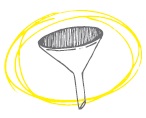 Wastes time, attention, and energy23—While you may manage to produce some output, productivity, engagement, and value are usually compromised. As the late Clifford Nass at Stanford University demonstrated in his research, people who multitask do not pay attention, memorize, or manage their tasks as well as individuals who focus on one thing at a time.
Wastes time, attention, and energy23—While you may manage to produce some output, productivity, engagement, and value are usually compromised. As the late Clifford Nass at Stanford University demonstrated in his research, people who multitask do not pay attention, memorize, or manage their tasks as well as individuals who focus on one thing at a time.
 Attacks output quality—Think you're great at multitasking? Bravo! Reports show that working on two or more projects simultaneously takes longer than if you worked on each one individually. Experts estimate that you suffer a 40% loss in productivity when you multitask. If you're not aiming for quality, you may work through multiple tasks, and do so quickly, but you actually create less and usually the value of your output suffers. You end up operating at a much more superficial level. Every time you take yourself out of the zone, it takes exponential time to get back into it before you can work at critical levels. Some trudge through it (that's me) and others become satisfied with average or substandard performance.
Attacks output quality—Think you're great at multitasking? Bravo! Reports show that working on two or more projects simultaneously takes longer than if you worked on each one individually. Experts estimate that you suffer a 40% loss in productivity when you multitask. If you're not aiming for quality, you may work through multiple tasks, and do so quickly, but you actually create less and usually the value of your output suffers. You end up operating at a much more superficial level. Every time you take yourself out of the zone, it takes exponential time to get back into it before you can work at critical levels. Some trudge through it (that's me) and others become satisfied with average or substandard performance.
 Makes you mistake prone—From typos to unexplained lapses in logic, random errors appear in everything you produce, because you're overwhelming the frontal cortex and not giving yourself enough depth and space for critical thinking.
Makes you mistake prone—From typos to unexplained lapses in logic, random errors appear in everything you produce, because you're overwhelming the frontal cortex and not giving yourself enough depth and space for critical thinking.
 Hinders intellectual and affective processes—One of the side effects of multitasking is skim reading. When the reading brain skims texts, “We don't have time to grasp complexity, to understand another's feelings or to perceive beauty,” according to Maryanne Wolf of UCLA.24 By compromising our intellectual and affective processes, we impair our internalized knowledge, our comprehension and ability to grasp complexity, analogical reasoning and inference, perspective-taking, empathy, and critical analysis. UCLA psychologist Patricia Greenfield warns that less attention and time will be allocated to slower, time-demanding, deep reading processes.25 Multitasking “prevents people from getting a deeper understanding of information,” Greenfield said.
Hinders intellectual and affective processes—One of the side effects of multitasking is skim reading. When the reading brain skims texts, “We don't have time to grasp complexity, to understand another's feelings or to perceive beauty,” according to Maryanne Wolf of UCLA.24 By compromising our intellectual and affective processes, we impair our internalized knowledge, our comprehension and ability to grasp complexity, analogical reasoning and inference, perspective-taking, empathy, and critical analysis. UCLA psychologist Patricia Greenfield warns that less attention and time will be allocated to slower, time-demanding, deep reading processes.25 Multitasking “prevents people from getting a deeper understanding of information,” Greenfield said.
 Causes stress—When you are switching between tasks, you place yourself in a mode of high alert or on the edge. Your true creativity is not kindled. Instead, your heart rate is up, and you produce the stress hormone cortisol.26 The pressure you feel triggers anxiety during and in-between tasks. Over time, performance in this mode can provoke chronic stress, self-esteem issues, and even depression.
Causes stress—When you are switching between tasks, you place yourself in a mode of high alert or on the edge. Your true creativity is not kindled. Instead, your heart rate is up, and you produce the stress hormone cortisol.26 The pressure you feel triggers anxiety during and in-between tasks. Over time, performance in this mode can provoke chronic stress, self-esteem issues, and even depression.
 Makes you miss out on life—If you're multitasking, you're missing out on many things on many fronts. Something as simple as walking and talking/texting/messaging makes you miss the beauty of your surroundings. Taking pictures or shooting videos might capture the images around you, but this doesn't necessarily allow your experiences to reverberate emotionally inside you. This inattentional blindness prevents your brain from processing experiences that inspire thinking and creativity. Furthermore, if it takes longer for you to complete tasks, you miss out on time for fun.
Makes you miss out on life—If you're multitasking, you're missing out on many things on many fronts. Something as simple as walking and talking/texting/messaging makes you miss the beauty of your surroundings. Taking pictures or shooting videos might capture the images around you, but this doesn't necessarily allow your experiences to reverberate emotionally inside you. This inattentional blindness prevents your brain from processing experiences that inspire thinking and creativity. Furthermore, if it takes longer for you to complete tasks, you miss out on time for fun.
 Affects your memory—Have you ever lost your train of thought or a common word in the middle of a story? Have you ever stood still and asked yourself, “What was I about to do?” Switching between tasks disrupts short-term memory.27 A 201628 study found that multitaskers exhibit weakness in working memory (the ability to store relevant information while working on a task) and long-term memory (the ability to store and recall information over longer periods of time). Other studies show that when you are interrupted, or if you interrupt yourself, you miss or forget details in the moment and as you continue your work.29
Affects your memory—Have you ever lost your train of thought or a common word in the middle of a story? Have you ever stood still and asked yourself, “What was I about to do?” Switching between tasks disrupts short-term memory.27 A 201628 study found that multitaskers exhibit weakness in working memory (the ability to store relevant information while working on a task) and long-term memory (the ability to store and recall information over longer periods of time). Other studies show that when you are interrupted, or if you interrupt yourself, you miss or forget details in the moment and as you continue your work.29
 Extinguishes creativity—Just like your laptop or tablet uses RAM (random access memory) to give you rapid working ability in your open tabs/windows, human multitasking uses working memory or temporary brain storage. The University of Illinois at Chicago found that jumping between activities exhausts this finite memory and leaves little or no energy for creativity. You're literally spent. More so, you're never truly in the moment. You don't give yourself the creative freedom to explore possibilities and build on them. Attention residue often limits you from starting with a blank canvas. Many times, you're thinking of another task while working on the one in front of you.
Extinguishes creativity—Just like your laptop or tablet uses RAM (random access memory) to give you rapid working ability in your open tabs/windows, human multitasking uses working memory or temporary brain storage. The University of Illinois at Chicago found that jumping between activities exhausts this finite memory and leaves little or no energy for creativity. You're literally spent. More so, you're never truly in the moment. You don't give yourself the creative freedom to explore possibilities and build on them. Attention residue often limits you from starting with a blank canvas. Many times, you're thinking of another task while working on the one in front of you.
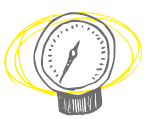 Lowers IQ—Not only does multitasking slow you down; it lowers your IQ, according to research conducted by the University of London.30 As I referenced before, during cognitive tasks, research participants who multitask experienced declines in IQ scores that were similar to the effects of staying up all night or smoking marijuana. In fact, the scores of multitasking men dropped to the average range of an 8-year-old child.
Lowers IQ—Not only does multitasking slow you down; it lowers your IQ, according to research conducted by the University of London.30 As I referenced before, during cognitive tasks, research participants who multitask experienced declines in IQ scores that were similar to the effects of staying up all night or smoking marijuana. In fact, the scores of multitasking men dropped to the average range of an 8-year-old child.
 Leads to increased distractibility—You've been there many times. You're working on something, you switch to check your streams, you see a link, you click it, and then 30 minutes later, you're wondering what just happened to the last half hour. You fell into online rabbit holes. Researchers have found that multitaskers exhibit increased behavioral distractibility.31 Your addiction deepens.32
Leads to increased distractibility—You've been there many times. You're working on something, you switch to check your streams, you see a link, you click it, and then 30 minutes later, you're wondering what just happened to the last half hour. You fell into online rabbit holes. Researchers have found that multitaskers exhibit increased behavioral distractibility.31 Your addiction deepens.32
 Hurts your relationships—At the most basic level, whether you're with loved ones, friends, colleagues, managers, teachers, and so on, if you break moments of engagement to mindlessly multitask, your actions, maybe not your words, say, “I'm only partially in this moment right now with you.” It's often referred to as technoference, and it signifies to the people you're with physically that they aren't your priority.33 Even if you're not looking at devices, because you're so wired to multitask, your mind is unfocused, flying off in a dozen different directions. Exclusive attention, listening, giving yourself, and investing these currencies into a relationship define the relationship. It's hard to do, which is why it's so special.
Hurts your relationships—At the most basic level, whether you're with loved ones, friends, colleagues, managers, teachers, and so on, if you break moments of engagement to mindlessly multitask, your actions, maybe not your words, say, “I'm only partially in this moment right now with you.” It's often referred to as technoference, and it signifies to the people you're with physically that they aren't your priority.33 Even if you're not looking at devices, because you're so wired to multitask, your mind is unfocused, flying off in a dozen different directions. Exclusive attention, listening, giving yourself, and investing these currencies into a relationship define the relationship. It's hard to do, which is why it's so special.
 Saps your energy—The cognitive costs are just one of the many assets you'll spend by multitasking. There are biological and emotional costs, as well. You're expending exorbitant energy, exhausting the oxygenated glucose in your brain.34 You're running down the fuel needed to focus.
Saps your energy—The cognitive costs are just one of the many assets you'll spend by multitasking. There are biological and emotional costs, as well. You're expending exorbitant energy, exhausting the oxygenated glucose in your brain.34 You're running down the fuel needed to focus.
 Can be dangerous—The more you multitask, the more it becomes second nature. Read this. It becomes almost like breathing. You don't think about its dangers, which is why so many people use their phones while driving. Or if you're one of the more responsible folks, you wait until stoplights to check your phone. You're driving or riding or moving under the influence. Even walking is dangerous. One study in New York City found that 20% of teenagers struck in crosswalks were on their devices. Ironically, they're often hit by smartphone zombie drivers.35 Just Google the number of accidents caused by zombie smartphone use. Go to YouTube and watch videos. Watch how quickly you get disgusted.
Can be dangerous—The more you multitask, the more it becomes second nature. Read this. It becomes almost like breathing. You don't think about its dangers, which is why so many people use their phones while driving. Or if you're one of the more responsible folks, you wait until stoplights to check your phone. You're driving or riding or moving under the influence. Even walking is dangerous. One study in New York City found that 20% of teenagers struck in crosswalks were on their devices. Ironically, they're often hit by smartphone zombie drivers.35 Just Google the number of accidents caused by zombie smartphone use. Go to YouTube and watch videos. Watch how quickly you get disgusted.
 May damage your brain—Researchers from the University of Sussex used MRI scans to compare the brains of multitaskers and normal people.36 They discovered that multitaskers had less brain density in gray matter, specifically the anterior cingulate cortex.37 I had to look that up. It's the area of the brain responsible for empathy and also cognitive and emotional control. Over- or underreact much? In all seriousness, while IQ is critical to success, EQ (emotional intelligence) is also important. For example, TalentSmart tested more than one million employees and found that 90% of top performers have high EQ scores. Multitasking is shown to lower IQ and if we read the MRI scans correctly, the same can be true for EQ.
May damage your brain—Researchers from the University of Sussex used MRI scans to compare the brains of multitaskers and normal people.36 They discovered that multitaskers had less brain density in gray matter, specifically the anterior cingulate cortex.37 I had to look that up. It's the area of the brain responsible for empathy and also cognitive and emotional control. Over- or underreact much? In all seriousness, while IQ is critical to success, EQ (emotional intelligence) is also important. For example, TalentSmart tested more than one million employees and found that 90% of top performers have high EQ scores. Multitasking is shown to lower IQ and if we read the MRI scans correctly, the same can be true for EQ.

We Are Culpable in Our Addiction
The gut-punching truth is that distraction has become one of our values. We actually welcome and enjoy it. The ability to manage distraction has even emerged as a new competency, according to New Yorker editor Joshua Rothman, and it's one that we, perhaps subconsciously, feel proud of.38
Distractions are largely welcome because they can temporarily save us from contending with the challenge of a difficult task . . . loneliness, fear, self-doubt, self-loathing, and insecurity.
What is the basis of our willingness to be distracted? Often, the allure of distractions is a by-product of our desire to avoid contending with problems in our lives, which we may not even have yet recognized.
Blaise Pascal, French mathematician, physicist, inventor, writer, and source of so many quotes we've read and shared in our lives, astutely observed, “All men's miseries derive from not being able to sit in a quiet room alone.”39 The irony is that we convince ourselves that such alone time would force us to focus on problems we're facing, which would cause us more pain.
Some experts believe that distractions are largely welcome because they can temporarily save us from contending with the challenge of a difficult task, or personal matters such as loneliness, fear, anxiety, self-doubt, self-loathing, and insecurity.40 There's also the very real problem that many of us do not enjoy the work we're doing.
Distractions are an escape.
Brandon Crawford, coauthor of The World Beyond Your Head: Becoming an Individual in an Age of Distraction, has another explanation for the appeal.41 He believes that at the heart of this succumbing to distraction is autonomy run amok. “We've taken things too far; we're now addicted to liberation,” he asserts. In his view, anything we have to do in any situation is a kind of prison. So, giving in to distraction becomes a way of asserting control. We give ourselves an escape to exert our autonomy, generating a false, short-lived sense of freedom.
It's not easy to see that we're doing this. I certainly didn't understand what was happening to me—how addicted I'd become to distraction. Without that knowledge, I couldn't learn how to heal. I couldn't rediscover my creativity and intentionally regain happiness if I didn't believe or feel they were lost in the first place.
It's easier to offer advice than it is to digest it, and it's easier to absorb it than it is to act on it and bring change to our lives. To admit problems in the way we're living causes discomfort, even pain, which automatically activates our defenses to save us from those difficulties. In a cruel twist of logic, our efforts to save ourselves often lead us into denial. All of our technological distractions have made that easier for us because they are designed to seem so useful and nurturing. What could be wrong with sharing our photos with friends? News alerts might inform us of something we really need to know. What if there's an accident on our normal route to work? Certainly, we should leave our phones on at all times if we've got kids in school. What if we're not there to get a text that a child is sick? And on and on and on.
When I bit the bullet and admitted I had a problem, I could begin to unravel what lay beneath all of my obsessive multitasking and unacknowledged tech addictions, and I began to see how my work, and my relationships, were suffering. That was when I devoted myself to learning how to heal.
Awareness is awakening.
Your own distraction probably snuck up on you, too, and perhaps you believe that you're getting by just fine. Maybe you're still keeping up with your work and nurturing your relationships pretty well. My advice is don't let the problem fester until you run into a crisis like I did. Think of it this way:
Let's say you have a car that has been showing annoying signs of issues over the last year. Sometimes the car suddenly stops running for no apparent reason when you pull up to a light, or before you've finished pulling into a parking space. “That's weird,” you think, but a quick key turn or button push and the car starts right back up. So, you keep driving it. You're too busy to take it in for repair. You always have some place to be and this is really just a nuisance; it's a lower priority than everything else on your packed agenda.
But now, let's say that the car starts stalling almost every time you come to a stop.
Let's also say that you're on your way to the most important event of your life. The car just keeps shutting down, at every light, every stop sign. You're overwhelmed with helplessness. You have to get to this event! You could kick yourself for not getting the car fixed.
We have to prioritize taking care of our bodies and minds; otherwise they're at some point going to fail us, and we can't know what marvelous life experiences we'll start missing out on.

We Can Take Our Attention Back
Every day when you wake up without a new, intentional mindset and resolve to change your trajectory toward a more positive vision and more productive behavior, you are, by default, beginning your day just as you did yesterday and the day before that. You are caught in a legacy trap, a routine of current behaviors and beliefs that govern your day and life ahead. You can never truly move forward without a conscious effort. You can only optimize the paradigm you're in now. Each day we further hardwire that cyclical programming. We can either become aware of our behaviors and how they're affecting us, or we can continue with the status quo.
Yes, our ability to think deeply and create are victims of the manipulations of digital capitalism. But you are now mindful of how your mind is being attacked and manipulated. You stand at a crossroads. What you do from this moment on is your choice. You can transform your FOMO from fear of missing out to finally over missing out. Awareness is where the journey toward a healthier, mindful, and fantastically creative life begins.
You were not put on this planet to validate your existence through the false validation of strangers. You are more important, able, and beautiful beyond any number of likes, comments, or followers can attest. You can find a new path by living your life as if no one is watching.

Notes
1https://www.fastcompany.com/40491939/netflix-ceo-reed-hastings-sleep-is-our-competition
2https://www.vice.com/en_us/article/vv5jkb/the-secret-ways-social-media-is-built-for-addiction
3https://www.interaction-design.org/literature/topics/persuasive-design
4https://www.1843magazine.com/features/the-scientists-who-make-apps-addictive
5https://screentimenetwork.org/apa?eType=EmailBlastContent&eId=5026ccf8-74e2-4f10-bc0e-d83dc030c894
6https://www.vox.com/2018/8/8/17664580/persuasive-technology-psychology
7https://www.nytimes.com/roomfordebate/2013/10/09/are-casinos-too-much-of-a-gamble/slot-machines-are-designed-to-addict
8https://yaleglobal.yale.edu/content/smartphone-addiction-slot-machine-your-pocket
9http://www.tristanharris.com/essays/
10https://www.amazon.com/Wired-Child-Reclaiming-Childhood-Digital/dp/150321169X
11https://www.vox.com/2018/8/8/17664580/persuasive-technology-psychology
12https://www.independent.co.uk/life-style/gadgets-and-tech/bill-gates-and-steve-jobs-raised-their-kids-techfree-and-it-shouldve-been-a-red-flag-a8017136.html
13https://techcrunch.com/2017/09/08/meet-the-tech-company-that-wants-to-make-you-even-more-addicted-to-your-phone/
14https://www.theverge.com/2017/12/11/16761016/former-facebook-exec-ripping-apart-society
15https://www.theverge.com/2017/11/9/16627724/sean-parker-facebook-childrens-brains-feedback-loop
16https://thenextweb.com/apple/2018/01/20/apple-ceo-becomes-latest-tech-bigwig-to-warn-of-social-medias-dangers/
17https://twitter.com/martyswant/status/960683198463250434
18https://www.weforum.org/agenda/2016/07/multitasking-is-exhausting-your-brain-say-neuroscientists
19http://www.businessinsider.com/teen-suicides-outnumber-homicides-smartphones-2017-8
20http://www.businessinsider.com/teen-suicides-outnumber-homicides-smartphones-2017-8
21https://www.ted.com/talks/manoush_zomorodi_how_boredom_can_lead_to_your_most_brilliant_ideas
22https://www.glassdoor.com/employers/blog/science-behind-multitasking-slowly-erodes-productivity/
23https://hbr.org/2015/06/conquering-digital-distraction
24https://www.theguardian.com/commentisfree/2018/aug/25/skim-reading-new-normal-maryanne-wolf?CMP=share_btn_fb
25http://newsroom.ucla.edu/releases/is-technology-producing-a-decline-79127
26https://bebrainfit.com/cognitive-costs-multitasking/
27http://www.ucsf.edu/news/2011/04/9676/ucsf-study-multitasking-reveals-switching-glitch-aging-brain
28https://www.ncbi.nlm.nih.gov/pubmed/26223469
29https://bits.blogs.nytimes.com/2011/04/11/multitasking-takes-toll-on-memory-study-finds/
30https://www.forbes.com/sites/travisbradberry/2014/10/08/multitasking-damages-your-brain-and-career-new-studies-suggest/
31http://www.sciencedirect.com/science/article/pii/S1053811916300441
32https://www.fastcompany.com/3057192/these-are-the-long-term-effects-of-multitasking
33https://www.psychologytoday.com/us/blog/the-squeaky-wheel/201501/how-cellphone-use-can-disconnect-your-relationship
34https://www.weforum.org/agenda/2016/07/multitasking-is-exhausting-your-brain-say-neuroscientists
35http://news.health.com/2012/10/02/many-pedestrians-hit-by-cars-are-distracted-by-mobile-devices/
36http://www.eurekalert.org/pub_releases/2014-09/uos-bsr092314.php08/multitasking-damages-your-brain-and-career-new-studies-suggest/
37https://www.psychologytoday.com/us/blog/the-squeaky-wheel/201606/10-real-risks-multitasking-mind-and-body
38https://www.newyorker.com/culture/cultural-comment/a-new-theory-of-distraction
39https://www.goodreads.com/quotes/19682-all-of-humanity-s-problems-stem-from-man-s-inability-to-sit
40https://www.fastcompany.com/40442595/the-real-reason-why-youre-easily-distracted-has-nothing-to-do-with-technology
41https://www.amazon.com/World-Beyond-Your-Head-Distraction/dp/0374535914
